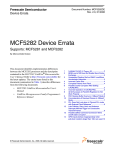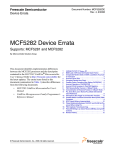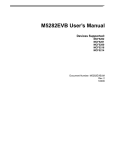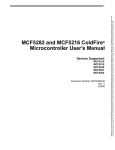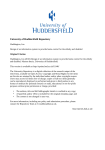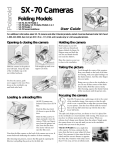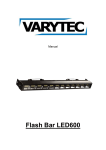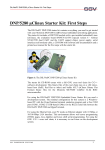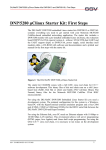Download MCF5216 Device Errata - Digi-Key
Transcript
Freescale Semiconductor Device Errata MCF5216 Device Errata This document identifies implementation differences between the MCF5216 processor and the description contained in the MCF5216 ColdFire® Microcontroller User’s Manual. Refer to http://motorola.com/ColdFire for the latest updates. The errata items listed in this document (summarized in Table 1) describe differences from the following documents: • MCF5216 ColdFire® Microcontroller User’s Manual • ColdFire Microprocessor Family Programmer’s Reference Manual NOTE Unless otherwise noted, information in this document also applies to the MCF5214. © Freescale Semiconductor, Inc., 2004. All rights reserved. MCF5216DE Rev. 1.7, 09/2004 Leakage Current on VDDPLL pin All current MCF5216 devices are marked as L95M mask set. The date code on the marking can be used to determine which errata have been corrected on a particular device as shown in Table 1. The datecode format is XXXYYWW, where YY represents the year and WW represents the work week. The three leading digits can be ignored. Table 1. Summary of MCF5216 Errata Date Code Affected Errata Module Date Errata XXX0324 <XXX032 ID Affected Added to ≥XXX0327 4 XXX0326 Errata Title 1 PLL 03/18/03 Yes No No Leakage current on VDDPLL pin 2 BDM 03/28/03 Yes Yes Yes BDM load of SR does not enable stack pointer exchange 3 EMAC 03/28/03 Yes Yes No Unexpected pipeline stall on EMAC load/store accumulator instruction 4 Cache 03/31/03 Yes Yes No Incorrect cache size 5 Flash 04/09/03 Yes Yes No Corrupted fetches from Flash 6 Cache 07/21/03 Yes Yes Yes Possible cache corruption after setting CACR[CINV] 7 Cache 07/21/03 Yes Yes Yes Incorrect operation of CACR[CFRZ] 8 FlexCAN 07/23/03 Yes Yes Yes 32-bit accesses to FlexCAN registers do not work properly 9 PLL 08/23/04 Yes Yes Yes PLL does not lock when in “Normal PLL mode with external clock reference” 1 Leakage Current on VDDPLL pin 1.1 Description The MCF5216 exhibits a 65mA leakage current on the VDDPLL supply, regardless of chip configuration. 1.2 Workaround No workaround. DATECODES AFFECTED: XXX0323 and earlier MCF5216 Device Errata, Rev. 1.7 2 Freescale Semiconductor BDM Load of SR Does Not Enable Stack Pointer Exchange 2 BDM Load of SR Does Not Enable Stack Pointer Exchange 2.1 Description The V2 core used in the MCF5216 adds support for separate user and supervisor stack pointers. The hardware implements an active stack pointer and an “other_stack_pointer.” Whenever the operating mode of the processor changes (supervisor user, user supervisor), the processor hardware “exchanges” the active SP and the other SP. This exchange operation does not work when the processor mode is changed by a write to the SR from the BDM port. The hardware in the processor core required to process the BDM load_SR operation and enable the stack pointer exchange is missing. The exchange works properly when the SR is changed through software. 2.2 Workaround Use software for any operations that require exchanging the stack pointers. DATECODES AFFECTED: All 3 Unexpected Pipeline Stall on EMAC Load/store Accumulator Instruction 3.1 Description An unexpected pipeline stall occurs for accumulator load and accumulator store instructions that immediately follow a load accumulator or MAC instruction. Specifically, the operand execution pipeline (OEP) experiences a 2T pipeline stall when a load/store accumulator instruction enters the pipeline immediately after any load accumulator or MAC instruction. The pipeline is supposed to stall only if there is a store accumulator instruction immediately following a load or MAC instruction that updated the specified accumulator. A simple example can be created to expose this problem: mac.l ra,rb,acc0 mac.l rc,rd,acc0 mov.l acc1,rx In the above example, the store of acc1 (mov.l acc1,rx) should not experience any stall since that accumulator is not being updated. In the current V2 + EMAC implementation, it incorrectly stalls for two cycles. MCF5216 Device Errata, Rev. 1.7 Freescale Semiconductor 3 Incorrect Cache Size NOTE The operation of the instructions is correct. The problem is that the expected timing is not met. 3.2 Workaround No workaround. DATECODES AFFECTED: XXX0326 and earlier 4 Incorrect Cache Size 4.1 Description The MCF5216 operates as if it were connected to an 8KB cache; however, the cache size is in fact 2KB. Once the 2KB cache is full, the cache controller can have erroneous hits in the cache space resulting in data and/or instruction corruption. 4.2 Workaround Do not enable the cache. DATECODES AFFECTED: XXX0326 and earlier 5 Corrupted Fetches from Flash 5.1 Description Leaving bit 6 in the FLASHBAR register cleared can cause corrupted fetches from the MCF5216’s internal Flash. For datecodes after XXX0327, the bit is hardwired high to prevent the corrupted accesses. 5.2 Workaround Set bit 6 in the FLASHBAR. This will prevent the corrupted fetches. DATECODES AFFECTED: XXX0326 and earlier MCF5216 Device Errata, Rev. 1.7 4 Freescale Semiconductor Possible Cache Corruption after Setting CACR[CINV] 6 Possible Cache Corruption after Setting CACR[CINV] 6.1 Description The cache on the MCF5216 was enhanced to function as a unified data and instruction cache, an instruction cache, or an operand cache. The cache function and organization is controlled by the cache control register (CACR). The CINV (Bit 24 = cache invalidate) bit in the CACR causes a cache clear. If the cache is configured as a unified cache and the CINV bit is set, the scope of the cache clear is controlled by two other bits in the CACR, INVI (BIT 21 = CINV instruction cache only) and INVD (BIT 20 = CINV data cache only). These bits allow the entire cache, just the instruction portion of the cache, or just the data portion of the cache to be cleared. If a write to the CACR is performed to clear the cache (CINV = BIT 24 set) and only a partial clear will be done (INVI = BIT 21 or INVD = BIT20 set), then cache corruption may occur. 6.2 Workaround All loads of the CACR that perform a cache clear operation (CINV = BIT 24) should be followed immediately by a NOP instruction. This avoids the cache corruption problem. DATECODES AFFECTED: All 7 Incorrect Operation of CACR[CFRZ] 7.1 Description The cache on the ColdFire V2 is controlled by the cache control register (CACR). When CACR[CFRZ] is set, the cache freeze function is enabled and no valid cache array entry will be displaced. However, this feature does not work as specified, sometimes allowing valid lines to be displaced when CACR[CFRZ] is enabled. This will not cause any corrupted accesses. However, there could be cache misses for data that was originally loaded into the cache but was subsequently deallocated even though the CACR[CFRZ] bit was set. Also, incoherent cache states are possible when a frozen cache is cleared via the CINV (bit 24 = cache invalidate) bit in the CACR. 7.2 • • Workaround Unfreeze the cache by clearing CACR[CFRZ] when invalidating the cache using the CACR[CINV] bit. Use the internal SRAM to store critical code/data if the system cannot handle a potential cache miss. MCF5216 Device Errata, Rev. 1.7 Freescale Semiconductor 5 32-bit Accesses to FlexCAN Registers Do Not Work Properly DATECODES AFFECTED: All 8 32-bit Accesses to FlexCAN Registers Do Not Work Properly 8.1 Description Since the FlexCAN was originally designed for 16-bit architectures, all 32-bit register accesses are broken down into two back-to-back 16-bit accesses. However, the timing for the back-to-back accesses is incorrect and leads to corruption of the second 16-bit read or write. 8.2 Workaround When reading or writing to the 32-bit RxMASK registers, use two 16-bit accesses instead of a single 32-bit access. DATECODES AFFECTED: All 9 PLL Does Not Lock When in “Normal PLL mode with External Clock Reference” 9.1 Description During a power on reset, if the CLKMOD[1:0] = 10 setting is used (normal PLL mode with external clock reference), then the MCF5282 PLL does not lock and the device never comes out of reset. 9.2 Workaround When configuring the PLL for “Normal PLL mode with external clock reference,” tie CLKMOD1 to RSTI and not straight to 3.3V. This allows the PLL to correctly detect the desired operating mode and lock. STATUS: Will be fixed DATECODES AFFECTED: All MCF5216 Device Errata, Rev. 1.7 6 Freescale Semiconductor THIS PAGE INTENTIONALLY LEFT BLANK MCF5216 Device Errata, Rev. 1.7 Freescale Semiconductor 7 How to Reach Us: Home Page: www.freescale.com E-mail: [email protected] USA/Europe or Locations Not Listed: Freescale Semiconductor Technical Information Center, CH370 1300 N. Alma School Road Chandler, Arizona 85224 +1-800-521-6274 or +1-480-768-2130 [email protected] Europe, Middle East, and Africa: Freescale Halbleiter Deutschland GmbH Technical Information Center Schatzbogen 7 81829 Muenchen, Germany +44 1296 380 456 (English) +46 8 52200080 (English) +49 89 92103 559 (German) +33 1 69 35 48 48 (French) [email protected] Japan: Freescale Semiconductor Japan Ltd. Technical Information Center 3-20-1, Minami-Azabu, Minato-ku Tokyo 106-0047, Japan 0120 191014 or +81 3 3440 3569 [email protected] Asia/Pacific: Freescale Semiconductor Hong Kong Ltd. Technical Information Center 2 Dai King Street Tai Po Industrial Estate Tai Po, N.T., Hong Kong +800 2666 8080 [email protected] For Literature Requests Only: Freescale Semiconductor Literature Distribution Center P.O. Box 5405 Denver, Colorado 80217 1-800-441-2447 or 303-675-2140 Fax: 303-675-2150 [email protected] Information in this document is provided solely to enable system and software implementers to use Freescale Semiconductor products. There are no express or implied copyright licenses granted hereunder to design or fabricate any integrated circuits or integrated circuits based on the information in this document. Freescale Semiconductor reserves the right to make changes without further notice to any products herein. Freescale Semiconductor makes no warranty, representation or guarantee regarding the suitability of its products for any particular purpose, nor does Freescale Semiconductor assume any liability arising out of the application or use of any product or circuit, and specifically disclaims any and all liability, including without limitation consequential or incidental damages. “Typical” parameters that may be provided in Freescale Semiconductor data sheets and/or specifications can and do vary in different applications and actual performance may vary over time. All operating parameters, including “Typicals”, must be validated for each customer application by customer’s technical experts. Freescale Semiconductor does not convey any license under its patent rights nor the rights of others. Freescale Semiconductor products are not designed, intended, or authorized for use as components in systems intended for surgical implant into the body, or other applications intended to support or sustain life, or for any other application in which the failure of the Freescale Semiconductor product could create a situation where personal injury or death may occur. Should Buyer purchase or use Freescale Semiconductor products for any such unintended or unauthorized application, Buyer shall indemnify and hold Freescale Semiconductor and its officers, employees, subsidiaries, affiliates, and distributors harmless against all claims, costs, damages, and expenses, and reasonable attorney fees arising out of, directly or indirectly, any claim of personal injury or death associated with such unintended or unauthorized use, even if such claim alleges that Freescale Semiconductor was negligent regarding the design or manufacture of the part. Freescale™ and the Freescale logo are trademarks of Freescale Semiconductor, Inc. All other product or service names are the property of their respective owners.© Freescale Semiconductor, Inc. 2004. All rights reserved. MCF5216DE Rev. 1.7 09/2004









